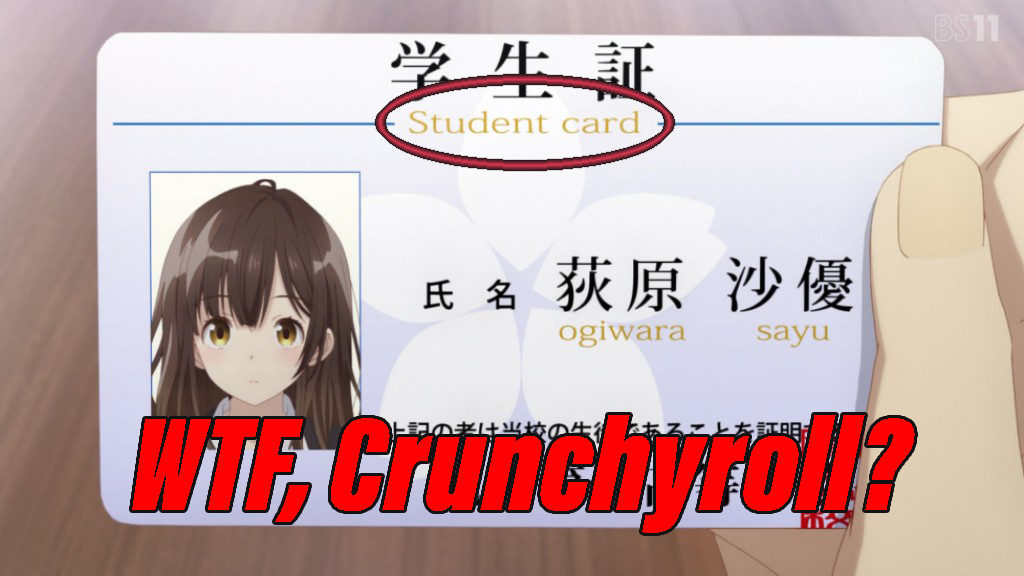WTF Is Up With The Spring 2021 Anime Season?

The Winter 2021 anime season brought us relaxing laid-back shows, deep and affirmative action dramas and touching and funny romantic comedies. Spring 2021 has brought us pedophilia. OK, then.
The difference between these two adjacent seasons couldn’t be more stark. The season that just ended had shows like the second season of Yuru Camp, about a group of girls who belong to a school camping club and their super chill adventures while camping. This is one of the best examples what the Japanese call iyashikei, or “healing shows.” Also in the Winter season was Wonder Egg Priority, a very deep look at teenage girls suicides told as a magical (science fictional?) action story, with outstanding character writing; and the touching and funny rom-com Horimiya. Then there was Season 2 of The Promised Neverland — OK, never mind that one.
As though to balance out all that excellence (not you, TPN), this season we have not one but two anime shows about an adult man and his inappropriate relationship with a teenage girl.
First to air was Koikimo, a show about a well-off womanizing absolute Chad of a young salaryman who becomes obsessed with his younger sister’s high school friend. The title Koikimo is a portmanteau of the full title in Japanese, which is Koi to Yobu ni wa Kimochi Warui, or It’s Too Sick to Call this Love. Seems pretty self-aware, actually, because this is really sick. In just the first episode (full disclosure, the only one I have seen or will) the salaryman Ryou offers to have sex with the high school girl Ichika — in his family’s house — in exchange for her saving him from a bad fall, refuses to stop sending her gifts when she insists that he stop, and physically assaults a former lover when she insults Ichika. So, a real catch of a guy.
All of this is played for the jokes, but any attempt at humor falls flat when it is based on how an adult male refuses to accept a “no” from a teenage girl. And to be clear, it would be just as unfunny if it was an adult woman Ryou was obsessing over and denying her wishes for him to stop, just much less creepy — and way less illegal.
Making its debut April 5 was Higehiro, also a portmanteau, this time of Hige wo Soru. Soshite Joshikousei wo Hirou. That translates to I Shaved. Then I Brought a High School Girl Home., a title that is more descriptive than the one above, and much more accurately disturbing. In this gem, the adult man Yoshida finds a high school girl on the street outside his apartment building as he is stumbling home very drunk well after midnight. Upon finding out the girl has no place to stay on the cold night, he offers his place, for which she immediately offers her body as payment. And Yoshida, so drunk that he can’t remember much of this encounter the next day, turns down her offer.
Higehiro flips the script on Koikimo by having the adult male lead supposedly a nice guy just trying to help out a troubled girl. And for all the criticisms that can justifiably be laid at Koikimo‘s feet, it doesn’t have any fan service (at least in that one episode). Higehiro, by contrast, constantly negates what seems to be its attempt to make the show about a good guy just helping out a troubled girl by showing — reveling, even — the girl Sayu’s panties or cleavage at every chance it gets in that first episode.
The studio behind Higehiro, Project No. 9, has made shows that make the nature of this new one not a big surprise. Its catalog includes Recently, My Sister Is Unusual, an anime about a young girl who is possessed by a ghost who is horny-on-main for the girl’s older brother, and makes her wear a — I kid you not — chastity belt in lieu of panties. Also from Project No. 9 was the recent garbage-tier anime SUPER HxEros, about superpowered teens that fight off alien invaders through the power of horniness (still not kidding). And finally The Ryuo’s Work is Never Done! about a teenage shogi grandmaster who finds himself taking on a series of young girl students all of whom want to be his wife — and all of whom are in grade school (God, I wish I was kidding).
The studio Nomad, maker of Koikimo, has a much less checkered past. It was the studio behind the ecchi-fest Kämpfer and all of its related products, but it also made all of the shows in the Rozen Maiden series. And it made the weird moe comedy Chronicles of the Going Home Club, which is much more moe than ecchi. So it is a mystery how it was convinced that the subject matter of Koikimo was up its alley.
And yes, I get it — Japan has a different standard for what is portrayed in fictional works than what is considered illegal actions in real life. Transgressive fictional content such as illicit relations with minors is considered acceptable in Japan — even commercially acceptable — because it is fictional and not a real action by a real person. In Japanese society, proper conduct is the foundational bedrock on which it rests, so it is easy for Japanese to believe that consuming transgressive content won’t directly lead to transgressive and illegal actions. Nothing could be further removed from Americans’ attitudes on that matter.
And here’s the problem — both of these new anime shows are being streamed on Crunchyroll, an American website and streaming service with a mission to bring anime and manga to the American audience. So why would it air two shows about adult men and their relationships with high school girls, in a culture in which such topics are not just inappropriate, but repugnant? In the ongoing growth of the #MeToo movement, a show like Koikimo in particular, with its clear message that a woman’s wishes or consent means nothing if there is a joke to be made, is particularly offensive in this country.
Frankly, Higehiro seems like mostly dumb ecchi to me, albeit in a pretty odious setting. Koikimo on the other hand is downright offensive, and potentially harmful.
I am a big dude, so I was repulsed but not deeply disturbed by the scene in Koikimo when Ryou grabs his napkin, shoves it in his former lover’s face and roughly grinds her makeup into a smeared mess, then threatens to rip off her actual eyelashes if she ever criticizes Ichika again. But I have women friends — many — for whom that scene would trigger a panic attack as the memory of their own abuser surfaced. Take the show’s own word for it — it’s “Too Sick.”
I’m not going to ask Japan to do better. Societal norms differ and while I am less sure of the strong dichotomy between thought and action in Japanese society than the authorities there seem to be, I understand it. But I can ask everyone at Crunchyroll to do better.
Crunchyroll, you should be ashamed. You should pull these two shows and apologize for airing them in the first place. And readers, avoid these shows like the plague. Not that I am confident you will take my advice — Higehiro, with just one episode aired, already has a rating on MyAnimeList.net of 7.03 out of 10.
If you like our work and want to show your appreciation, feel free to tip us at Ko-fi or become a patron on Patreon.



